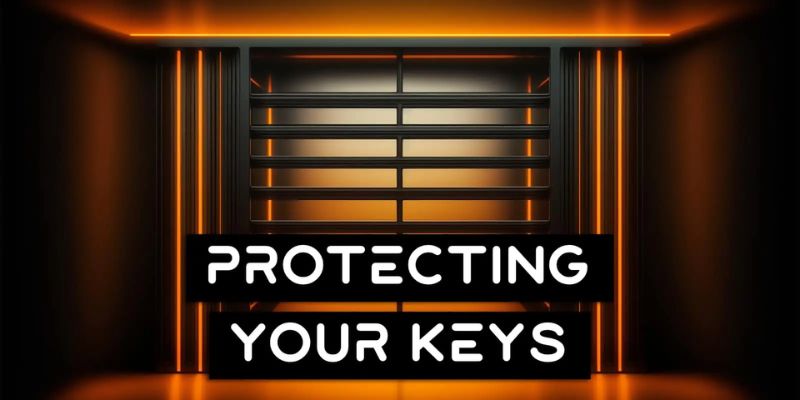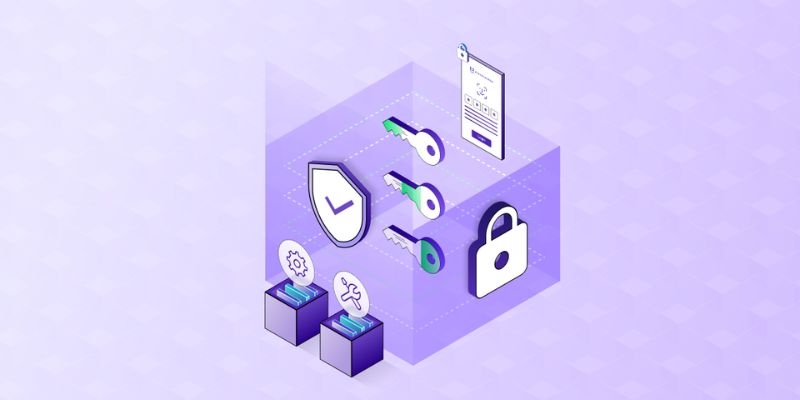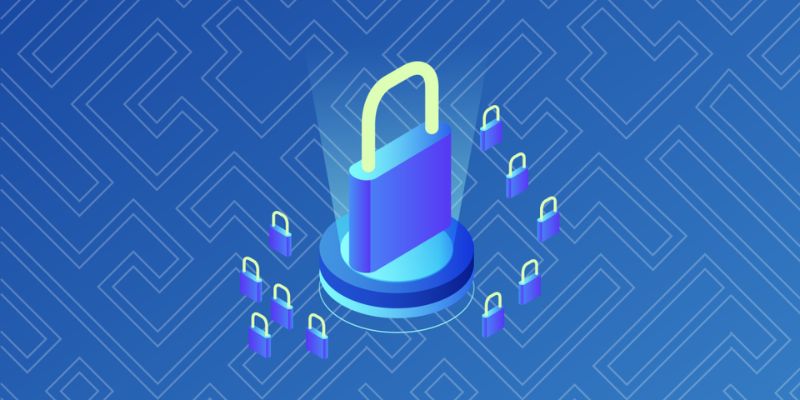How to protect your crypto private key ain’t no walk in the park. It’s your wallet’s watchdog, your digital dough’s defender. And let’s face it, the web’s a wild west of hackers and hazards. How do you shield that precious key from prying eyes and sticky fingers? Fear not! Here are five rock-solid strategies designed to lock down your crypto fortress. From dodging common dangers to outsmarting savvy cyber crooks, I’ve got your back. Ready to become a crypto safety savant? Let’s dive in!
Understanding the Importance of Private Key Security in Cryptocurrency
The Role of Private Keys in Secure Digital Transactions
Your private key is like a secret code. It lets you use your crypto safely. If someone else gets it, they can take your coins. So, you need to keep it secret to stay safe. Imagine you have a magic diary that no one can open without a secret word. Your key is just like that word. It keeps your digital money locked away and safe.
Common Threats to Private Key Security and How to Counter Them
Bad guys always want to steal your secret codes. They try tricks like fake websites or harmful software. They might even try to trick you into giving them your key. Now, to stop these thieves, there are cool tools you can use. Things like codes that change all the time, special USBs for your coins, and even using your fingerprint!
Think about keeping your coins offline sometimes, where thieves can’t reach them. It’s like having a treasure chest buried in a secret place. Also, write down your secret key words on paper. Put them somewhere safe, like a locked box. This way, if your computer breaks, you still have your secret keys. Remember, your crypto is only as safe as where you keep your keys. So, be smart and keep them locked up tight!
Implementing Strong Encryption and Backup Solutions
Essential Practices for Private Key Encryption
Keep your crypto safe with strong encryption. Private key encryption stops thieves cold. Encrypt keys with powerful tools that turn them into tough codes. Use complex passwords that mix letters, numbers, and symbols. Don’t pick obvious ones, like birthdays or simple patterns. Make it hard to guess. Always use new, unique passwords for different accounts. This stops one break-in from becoming many.
Next, add layers with two-step verification or biometric security. Think of it like a secret clubhouse. First, you give the password. Then, you show your face or scan a fingerprint. This makes sure it’s really you. Biometric security feels like sci-fi but it’s real and it’s here. It uses your body’s unique features to lock down access.
Developing Robust Backup Strategies for Key Safeguarding
Backups can save your skin. If you lose your key, backups are your lifeline. Go for paper and digital copies. Keep these backups in different places, safe from fire and water. Think of a bank vault or a locked drawer. Tell someone you trust where they are. If something happens to you, they should know how to find and use them.
With digital backups, like on USB drives, keep them offline. An air-gapped computer that never touches the internet is good for this. It’s like keeping treasure on an island no one else can reach. Don’t forget to make a few copies. Keep them secure, like your precious private keys.
Splitting your key into parts, or “sharding,” adds safety. Store each part in a different spot. Like a puzzle, you need all pieces to see the whole picture. Thieves would have to find every piece to steal your key. It’s extra work, but your peace of mind is worth it.
Hardware wallets are gold for keeping keys safe. They’re like mini-vaults that store keys away from the internet’s prying eyes. Use them to seal your keys in a fortress of tech.
For recovery seeds, the words that can restore your wallet, be extra careful. Write them down. Lock them away. Never tell them to anyone unless they’re a backup person, someone to help if you can’t.
Remember, your private key is a powerful tool. Keep it under lock and key, both digitally and physically. Above all, stay smart and stay safe. This is your money’s shield. Put these strategies to work and sleep well knowing your digital treasure is secure.
Utilizing Advanced Security Tools and Techniques
The Significance of Multifactor Authentication in Crypto Security
Multifactor authentication (MFA) keeps your crypto safe. It adds more than one check to get in. For example, you enter a password and then a code your phone gets. This blocks bad folks even if they know your password. MFA is a strong guard for your digital coins. So, always turn on MFA for your wallet.
After typing your password, MFA asks for another piece of info. This extra step could be a fingerprint, a code, or a key only you have. By doing this, we set up a strong wall. Bad guys need both your password and this second key. It’s hard for them to get both. It’s like having two locks on your door. Your stuff stays safe even if a thief breaks one lock.
MFA is vital for securing your cryptocurrency. If someone steals your password, MFA keeps them out. It is a must for anyone serious about keeping their coins secure.
Benefits of Employing Hardware Wallets for Enhanced Protection
Hardware wallets are like super vaults for your crypto. They store your private keys offline. This means hackers can’t reach them over the internet. These small devices link to your computer only when you need a transaction. This keeps your keys safe from online threats.
Think of a hardware wallet as a personal safe that never touches the net. It’s super tough for hackers to crack. You plug it in, send or get crypto, then unplug. Your private keys never leave the device. So, your assets stay snug as a bug in a rug.
When you use a hardware wallet, it’s as if your crypto is in a bank vault. But you are the bank! You control access, and your digital money gets the best shield possible. It’s a smart move for anyone who wants top-level security for their coins. Hardware wallets are a go-to for peace of mind in crypto storage.
By using these tools, you create a fortress for your crypto. You guard against hackers, thieves, and any other dangers. Remember, in the wild world of crypto, staying secure is your top job. Use MFA and a hardware wallet to keep your coins under lock and key!
Ensuring Best Practices for Ongoing Key Management
Importance of Regularly Updating Security Measures and Private Key Rotation
Think of your private key as the secret code to your digital vault. If someone gets it, they get your crypto. That’s why keeping your security fresh matters. Like changing the locks at home, sometimes you need to twist up your security game. We call this private key rotation. It’s a must for keeping sneaky hackers at bay.
How often should you switch it up? Regular key updates can vary. Some say do it yearly; others go for every few months. It all depends on how you use your crypto. Heavy traders might do it more often. Light users, perhaps less. Still, make sure you’re on top of it.
And don’t forget, each time you make a new key, you need a solid backup. It’s like having a spare key for your car. If you lose one, you’re not stranded. Backup strategies for keys can be simple. Use an encrypted USB drive or even write it down and lock it away. Just make sure it’s safe and you can get to it if needed.
Planning for the Future: Inheritance Strategies and Quantum-Resistance Considerations
Life is unexpected. What happens to your crypto if you’re gone? Inheritance planning isn’t fun to think about. But it’s super important. You don’t want your digital gold to vanish into thin air, right? Set up a plan. This way, your loved ones can find and use your crypto when you can’t.
Teach them how to get to it, too. They’ll need to know about hardware wallet protection and how to dodge phishing attacks. Make sure they’re in the loop about using secure networks and keeping that recovery seed safe.
Looking ahead, there’s talk about quantum computers. These super machines could one day crack today’s encryption like a nut. Crazy, huh? So, what’s the plan? We start looking at quantum-resistant encryption now. This way, we’re not caught off guard later.
Tech moves super fast and so do the bad guys. Staying one step ahead is key. We’re talking strong password practices, avoiding private key exposure, and getting savvy about secure cryptographic storage.
Sure, all this might sound like a lot. But take it one step at a time. Beef up your crypto’s armor and keep those digital dollars safe. Your future self will thank you big time. Remember, in the world of crypto, you’re the guardian of your own wealth. So let’s lock it down!
We’ve explored how vital private keys are for keeping our digital transactions safe. You’ve learned the dangers they face and ways to fight them. Strong encryption and smart backup solutions are key––they’re your safety net. By using tools like multifactor authentication and hardware wallets, your keys get an extra security layer.
Remember, your crypto’s safety rests on how well you manage your private keys. Keep your security steps fresh and make plans for the future, like how to pass on keys and protecting against quantum threats. Stay sharp and proactive. Your crypto relies on it.
Q&A :
How can I ensure the security of my cryptocurrency private key?
Securing your cryptocurrency private key is critical to safeguard your digital assets from unauthorized access and potential theft. One fundamental step is to keep your private key offline whenever possible, using hardware wallets or paper wallets. Additionally, you should use strong, unique passwords for any online wallet services, and consider multi-factor authentication for added security. It’s crucial not to share your private key with anyone and always be wary of phishing attempts. Regularly updating software associated with your crypto assets can also prevent vulnerabilities.
What is the best way to store a crypto private key?
The best way to store a crypto private key is to use a combination of both cold and hot storage methods. For the highest security, cold storage options like hardware wallets or paper wallets are recommended. These devices are not connected to the internet, making them less susceptible to hacking. However, you might also want to retain convenient access to your funds with hot wallets (connected to the internet) for day-to-day transactions, but with lower amounts of crypto. Whichever method you choose, it’s essential to backup your private keys meticulously.
Are there any trusted software tools to manage crypto private keys?
Yes, there are trusted software tools known as cryptocurrency wallet applications that help manage and protect your private keys. These wallets come in various forms, including desktop applications, mobile apps, and browser extensions. It is essential to download wallet software from reputable sources and verify any application through community forums or official websites. High-quality wallet applications typically incorporate advanced security measures such as encryption and multi-factor authentication to enhance the protection of your private keys.
Can two-factor authentication (2FA) help protect my crypto private key?
Two-factor authentication (2FA) significantly enhances the security of your crypto holdings. It requires a second form of verification beyond just the private key or password. This could be something you know (like a PIN), something you have (like a smartphone app or hardware token), or something you are (like a fingerprint). Implementing 2FA on any online wallets or exchange platforms where you store your private keys can provide an extra layer of defense against unauthorized access.
What practices should I avoid to keep my crypto private key safe?
Certain practices can jeopardize the safety of your crypto private key; these should be avoided at all costs. Do not enter your private key on unrecognized or suspicious websites. Avoid storing your key in plain text on computers, phones, or online services susceptible to hacking. Sharing your key with others is a strict no-no unless it’s in a formal multisignature setup among trusted parties. Lastly, be cautious when using public Wi-Fi networks, as they can be insecure and expose your data to cyber threats. Regularly update your knowledge on security best practices to stay ahead of potential risks.



